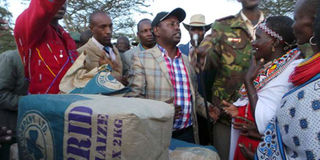Sell new seed varieties, firms asked

Farmers receive maize and beans seeds at Lonkurate area in Samburu Central Sub-county. Crop researchers have challenged local seed companies to fast-track production of newly released seeds to help smallholder farmers boost their crops production. PHOTO | JOHNSTON KETI | NATION MEDIA GROUP
What you need to know:
- The scientists noted that most seed companies still sell seeds that were developed as far as 10 years.
- Three varieties resistant to Maize Lethal Necrosis Disease released by CYMMIT last year are already available in Uganda and Tanzania markets, as local seed companies keep farmers waiting.
- It is also important that the companies offer extension services so that farmers are empowered to attain higher yields.
Regional crop researchers have challenged local seed companies to fast-track production of newly released seeds to help smallholder farmers boost production.
The scientists noted that most seed companies still sell seeds that were developed as far as 10 years ago while delaying the production of newly developed seeds that are tolerant to prevailing climatic conditions.
Dr Moses Siambi, regional director of International Crops Research Institute for the Semi-Arid Tropics, asked the companies to do away with outdated seeds.
Outdated crop varieties were responsible for dwindling yields and rise in diseases.
“We have developed several seed varieties for the dry land areas but farmers cannot access them.
Kari Mtama1 sorghum variety, for instance, was developed here in Kenya and farmers in Tanzania and Malawi accessed them almost the same year, yet it has not reached our farmers five years later,” Dr Siambi said during the African Seed Trade Association conference held in Nairobi recently.
KEEP FARMERS WAITING
Three varieties resistant to Maize Lethal Necrosis Disease released by CYMMIT last year are already available in Uganda and Tanzania markets, as local seed companies keep farmers waiting.
“As scientists, our duty is to research and come up with new crop varieties which we pass to seed companies. It is the companies’ mandate to multiply the seeds and market the varieties to farmers.” said Dr BM Prasana, the director global maize program at CYMMIT.
Dr Victor Sefa, a researcher at World Vegetable Centre, also urged the companies to provide farmers with seeds in smaller packages to make them affordable.
“It is also important that the companies offer extension services so that farmers are empowered to attain higher yields.”





